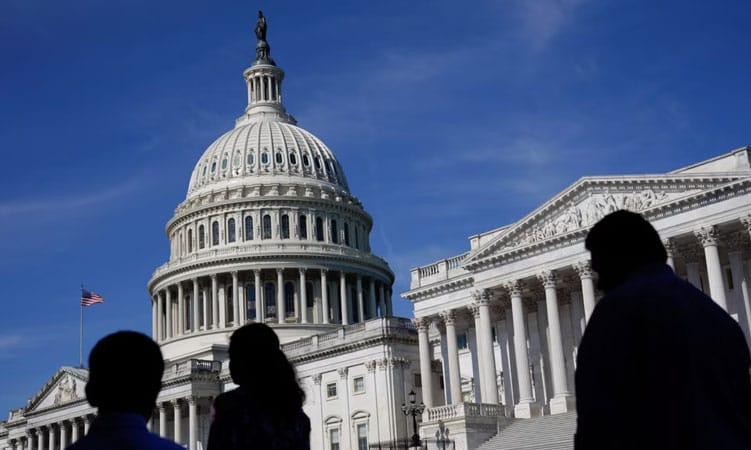Big Tech's AI Moratorium Disaster for Consumer Protection

Welcome back to The Dispatch from The Tech Oversight Project, your weekly updates on all things tech accountability. Follow us on Twitter at @Tech_Oversight and @techoversight.bsky.social on Bluesky.

BIG TECH DECLARED WAR ON STATE AI REGS: House Republicans just slipped a ten-year moratorium on state AI regulations into the budget bill headed for a vote later this week. This is Big Tech’s mask-off moment, as lobbyists push to scuttle states’ recent progress passing laws that protect kids and adults from chatbots, revenge porn, scammers, and other AI dangers and grow competitive markets.
An Avengers-style group of bipartisan state AGs, lawmakers, regulators and civil society groups is assembing to fight back and sound the alarm on what our Sacha Haworth has rightly called an “insane demand.”
Despite the widespread protest, the provision is headed to the House floor, but faces headwinds in the Senate that include bipartisan concern and significant procedural hurdles. Sens. John Cornyn and Ted Cruz have suggested it won’t get through reconciliation, and Reps. Alexandria Ocasio-Cortez and Lizzie Fletcher got the majority counsel to admit that the measure is not purely budgetary.
Unfortunately, even if A.I. lobbyists don’t end up getting their moratorium this time, they’re threatening to come back with a standalone measure. We’re not expecting Big Tech to let up on this extreme quest to flex political power against democratically-elected state lawmakers anytime soon – so we’re not going to stop calling them out and fighting back.

“This provision gives Big Tech what it wants, which is: no rules, no accountability, and billions in profit. They aren’t passing this moratorium in tandem with comprehensive AI regulations, they’re just passing a get-out-of-jail-free card from state legislation.”
– Jonathan Mehta Stein, chair of the California Initiative for Technology and Democracy

🏛️ STATE LAWMAKERS PUSH BACK: Lawmakers are outraged by the federal proposal to block state AI regs. The National Conference of State Legislatures has a list of every AI-related bill passed in the states in 2024, and it makes clear just how many laws to protect us could be axed if the Big Tech A.I. lobby gets its way.
There’s deep bipartisan concern in states including California, which has been at the forefront of commonsense AI safety rules to prevent algorithmic pricing and bias, to protect kids from abuse, and to stop fraudsters from using AI to impersonate people. In New York, legislators are teaming up to fight back. As eight state legislative leaders on tech representing seven states wrote in an open letter last week: “A decade of deregulation isn’t a path forward. It’s an abdication of responsibility.”

📣 AI WHISTLEBLOWERS: Sen. Chuck Grassley introduced new legislation to provide whistleblower protections for employees working on AI. The bill, which already has bipartisan sponsors in both the House and Senate, would protect whistleblowers who come forward with information about national security or public safety risks.
SPEAKING OF WHISTLEBLOWERS: Sen. Grassley is also investigating allegations that Meta’s senior leadership, in particular Joel Kaplan (now Meta’s Chief Global Affairs Officer), created a hostile culture and harassed subordinate employees – as detailed by Sarah Wynn-Williams, whose explosive book Careless People detailed Zuckerberg’s attempts to capture the Chinese market and willingness to sacrifice user privacy and human rights on the altar of growth.
Grassley’s letter to Meta includes shocking quotes attributed to Kaplan, including allegations that Kaplan called himself an employee’s “sugar daddy” and offered to buy them gifts, and that Kaplan used incredibly vulgar sexual language in everyday business communication. Grassley has demanded full disclosure of any other sexual harassment or workplace misconduct complaints the company might have concealed.

MORE META MISSTEPS: The ongoing FTC v. Meta trial has revealed even more shocking info about how the company abused the public’s trust once it had a monopoly. In one memorable exchange, 2018 emails from a senior executive suggested up to 40% of activity on Instagram might be “fake.” The executive advocated for stronger protections against bots and scammers, but was overruled – the company knew they had a captive audience.
Just a few weeks ago, Meta’s AI chatbots were caught sexting with minors. Now Congress wants to block AI regulation? We need more eyes on out-of-control Big Tech “innovations,” not fewer.

- Nearly 50% of all scam complaints to payment processor Zelle were about scams that originated on Meta platforms. Current and former staffers have said Meta knows about the dangers, but cracking down would cut its revenue from scammers’ ads.
- Internal analysis in 2022 found that 70% of new advertisers on Meta platforms were promoting “scams, illicit goods, or low quality products.”
- Meta allows advertisers to get caught committing fraud up to 32 times before it bans their accounts.

✅ BLUE CHECK TERRORISTS: A new Tech Transparency Project report shows terrorist leaders sanctioned by the U.S. government are paying X for expanded reach and a boost to their messaging. A Hezbollah founder, an al-Qaida advisor, the leader of an Iraqi militia that has attacked our troops – they’ve all paid for blue checks so they appear “official” and can get amplified to more users.
That’s against federal law, and X knows it’s happening. But 18 months ago Elon Musk broke up his Trust and Safety team because he’d rather not “waste” money on user protection. Companies like X have shown us time and time again they can’t be trusted to self-regulate, and Congress needs to step in.

MSNBC: Op-Ed: Republicans want to pass a giveaway to Trump’s new favorite industry
Sacha Haworth, The Tech Oversight Project’s Executive Director, sounded the alarm in an MSNBC op-ed about the Big Tech giveaways in the GENIUS Act. The bill, which would let the world’s biggest companies launch their own currencies, passed cloture in the Senate last night, after being blocked the prior week. The bill has been the subject of intense pressure from Big Tech lobbyists, and Democrats need to stand firm in blocking monopolies like Meta, Google, Amazon, and Apple from tanking our economy for their own gain.
Sacha Haworth: “Big Tech already has unprecedented access into every part of our daily lives, including not just where we shop and what we buy, but who we know, where we go, who our children are, what we search for and what we talk, email and text about. And the GENIUS Act would fulfill their wildest monopoly wishes."

